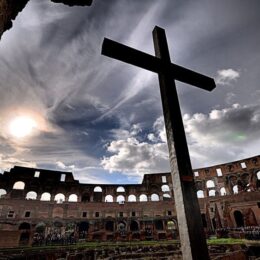CrossWalk.com | Tony Beam | March 9, 2009
The news for people of faith is not good. Since 1990, the last time the survey was conducted, the number of people who claim no religion at all has risen from 8% to 15%. In contrast, all of the mainline denominations have seen a significant decline in the number of people who describe themselves as participants. According to the survey, the number of Baptist declined from 19.3% to 15.8%. Methodists dropped from 8% to 5% and there are now approximately 2.8 million people who identify themselves with some sort of “new religious movement,” including “Wiccan, pagan, or Spiritualist.” These numbers are all the more troubling when you consider the fact that the adult population of the United States increased by “nearly 50 million” during the same 18-year period.
American Religious Identification Survey (ARIS) also revealed a major demographic shift in the religious makeup of the country according to geographic region. The Deep South and California saw significant increases in the Catholic population while Protestant numbers in those areas remained static or declined. For example, my state of South Carolina saw shrinkage in the number of Protestants from 88% of the population in 1990 down to 73% in 2008. During the same time period, the number of Catholics rose from 6% to 10% and the number of those who answered “none” to the religious preference question more than tripled rising from 3% to 10%.
The only bright spot in the survey may be the number of people who indentify themselves as a “generic Christian,” by describing themselves, not as denominational but as “born again, Christian, non-denominational, or evangelical.” That number remained statistically the same at 14.2%.
The information gleaned by the ARIS will not come as a surprise for most Christian leaders. It doesn’t take a survey to convince people who are on the front lines of Christian service and ministry that it is getting harder every year, not only to reach those who are unchurched but also to retain the churched. Why? Why are so many people in America leaving the faith and so few turning to Christ though faith? I believe there are many reasons both large and small but I think they can all be summarized in five broad categories.
1. Since 1990, there has been a significant rise in the number of people who are what I call “aggressive atheists.” In past generations, atheists have been a rather quiet group, preferring to keep their unbelief to themselves. But the last 18 years has seen a sharp rise in the number of aggressive atheists who proclaim their atheism with enthusiasm and have gone on what could be called an “anti-evangelism” or “reverse evangelism” mission with the goal being the destruction of any belief in God. This has a chilling effect on believers as they are caught somewhat flat-footed and unprepared to defend their beliefs against the attacks of these aggressive atheists. This leads us to the second reason for decline.
2. The abandonment by the local church of apologetics as a major part of Christian discipline. Many Christians are unwilling or unable to defend their faith because they haven’t been systematically taught the Truth and how to defend it. The concept of absolute Truth has been under assault since mid-19th century German liberalism began to creep into the theological thinking of many Americans. Truth must be defined before it can be defended and most churches spend little or no time teaching people how to do either. Focus on the Families “Truth Project” and other Para-church attempts at promoting apologetics are good but for the most part, they are not translating into the teaching of the local church.
3. The combination of traditional religious teaching with the new age concept of spirituality. The “Oprahization” of the church is well under way with millions now tuning in (through TV and the web) and turning on to Oprah Winfrey’s brand of homogenized religion. Being spiritual, as defined by Eckhart Tolle and others means simply believing in a nebulous force that might work well for Star Wars Jedi but in the real world, is nothing but new age nonsense.
4. The negative portrayal of Christianity in the culture by the media and the proliferation of scandals within the Church. The media loves a good church scandal and unfortunately, church leaders in America have been more than happy to provide the media with plenty of material. From pedophiles masquerading as Catholic Priests to Protestant ministers who can’t keep their wedding vows, people are losing faith in their religious leaders. The media piles on with negative portrayals of organized religion portraying the extremist Fred Phelps as an accurate picture of typical evangelicalism.
5. A lack of emphasis in the Church on evangelism as defined by personal conversion and a reluctance by the Church to embrace new methods of communication for the purpose of evangelism. Many churches have stopped trying to evangelize and many of those that are still trying are using methods that were effective in 1955 but fail to connect in the 21st century. The Emerging Church movement tends to blur the lines between believing and belonging, therefore minimizing the need for personal conversion. Many churches that still believe people are lost and need to be saved are still preaching the truth but the message is getting lost in all the cultural background noise. The Church has to find a way to cut through the static and reach people through the building of relationships.
The Church in America must effectively deal with these challenges if we are going to reverse the decline of Christianity in the next generation.
. . . more




Point #1 is just flat out heresy. Blaming the decline of Christianity on “aggressive atheists” is an insult to Christianity itself and implies that the faith’s truth cannot stand on its own two feet. The aggressive unbeliever (be he in Jerusalem, Constantinople, or wherever) has never been a problem in 2000 years of Christianity. It is spurious to start citing that symptom as the root cause now.
What has changed is the role of the state in people’s lives. As the reach of the government goes up, the influence of religion goes down. Many think they don’t need religion because every the state is there to attend to their every need. For its benevolence, the state only asks for your vote and your loyalty at the shrine of multiculturalism. With just these two acknowledgments, you can engage in a whole universe of depravity. It offers material and tactile plenty beyond what is normally available, and many find that much more appealing than the ascetic and high-purposed life of a Christian.
The only way is to limit the power of the state – not to deprive people of “the good life” – but to return a natural balance to the world. Our economic woes display a gross imbalance; our national and individual debts show this cannot last forever. But as long as the nation plays at God, Christianity will find itself competing against an opponent that has given itself the resources to offer all the pleasures of a day. Many will choose those things over Christianity when given the choice. Therefore, remove the choice.
Bill W.,
Please read point #1 again. It is the lack of preparation and foundation in the faith that leaves an opening for the ‘aggressive atheism’ the author mentions. When emotionalism, dry legalism or ethinic culture substitutes for a living encourter with the person of Jesus Christ; a dynamic understanding of the Holy Scripture and personal devotion what else is to be expected.
When God is presented as He is in much of what passes for Christianity, the only rational response is to say, “if that’s really God, no thanks”. The decline in Christianity is due exclusively to folks choosing the world over Christ, it is because they are not even offered Christ at all.
What to you mean when you say “Many will choose those things over Christianity when given the choice. Therefore, remove the choice.”
My sentance:
Should have read: The decline in Christianity is not due exclusively to folks choosing the world over Christ, but because folks are not even offered Christ at all.
But many do choose the world over Christ while well aware of both alternatives. Churches used to be what people turned to in times of need, but now many Americans expect the federal government to take care of them from cradle to grave. I think we should remove the government’s ability to do so – to restore our self-reliance, to protect us from the inevitable tyranny that results, and to restore Christianity as the guiding philosophy of people’s lives. For many, people believe in government; they invest all their hopes for future in it. Meanwhile the faith withers.
Bill,
Indeed, we love the created thing more than our Creator. Nothing unique to our time.
Just remember, there is no coercion in Christ. We freely sin, we must freely repent. Human beings have the type of government we want. Most governments are tyranncial because we really don’t want the resposibility that comes with freedom. It is too easy for us to slide into the license to which we are tempted.
To change the government we have to change.
Not trying to keep prattling on about this, but people rarely get the government they want. History is replete with examples of tyrannies, empires, conquests, and dictatorships that spanned several generations. Millions of 20th-century Russians, for example, never experienced a government they wanted. What forms most Americans’ frame of reference – that government is the servant of the people – is a historical anomaly. Even in those that claimed to obey the people, it ended in Caesar.
Understand that there is no element of coercion in my suggestion. To see coercion we should look to the system already in place. If you do not pay taxes (much of which will be used to fund anti-Christian programs), you go to jail. If a church gets too lippy about the goings of society, it loses its tax-free exemption. You should replace Christmas with “Winter Party” in your office or you risk termination. Threats and self-abasement guide much of our daily lives…threats imposed by the state we live under. As George Washington said, government is force – not eloquence, not reason. Its sine qua none is to tell us how we shall live. Our Constitution was merely intended to limit that…
Instead of coercion, I say we stop forcibly taking one person’s money to give to another. We should free employees from the fear of expressing their faith in the public square. We should stop the secularist hand that feeds millions of Americans, because with the comfortable life provided we see an increase of secularism and people very comfortable with it. And this end is accomplished because if you don’t pay the taxes that fund this, you go to jail. Now that is coercion.
I’m with you, Bill W., about the desirability of liberty. But I think Mr. Bauman has a point. If people don’t want coersion, why don’t they demand of representatives, executives, and justices that governmental power be restrained so it conforms to obvious constitutional limitations? Why don’t they demand that their schools (all grade levels and colleges) stop indoctrinating their children to rely on government largesse? This is simple enough given fair elections.
Religions come and go, they evolve and they fade out. I am an atheist because it truly is the most natural way of thinking that comes to me. I am not aggressive at all in my pursuit of the truth. As a matter of fact, I am the only atheist in my family and 90% of my friends all affiliate with a religion.
I don’t think that “blaming” atheists for the evolution of Christianity into something less traditional flies. The fact is, the majority of people in this world believe in a supreme being. Islam is growing faster than Christianity and atheism. Why is Islam not being “blamed” in this post?
Understand, I don’t think anyone should be blamed. I believe in balance. I believe that all of us are naturally inclined to certain ways of thinking and perceiving. We balance each other out. There will never be a human race that is 100% atheistic, nor will there ever be a human race that is 100% religious, even though the majority of the world is religious. There are majorities and there are minorities.
Sound out if you will, sir, but I would encourage you to put aside the gloom and doom. The tides may ebb and flow, but the world is as it should be.
Oh yes, and to respond to “Churches used to be what people turned to in times of need, but now many Americans expect the federal government to take care of them from cradle to grave.”
I think churches fill the community’s need to come together, do good, and share in spirituality. The government will never replace this need. As long as there is suffering in the world, as long as human beings place great value on life, there will be religion and there will be churches in kind.
Some of us do not affiliate with a religion because our philosophy is to reach out to one another without the love triangle of a supreme being. We are humanistic, rather than dogmatic.
Government has nothing to do with it. But if I were to follow your reasoning, I’d think if government “steals” people away from religion, than perhaps the message of religion is not as strong and clear as it claims to be.
Robert Bork once wrote the following on affluence:
Isn’t this an argument against allowing people to acquire too much and of getting too comfortable with their riches? I say this as someone who has plenty of nice stuff (all of which I’ve paid for out of my own earnings), so I’m not arguing for anyone taking the things that I’m quite fond of! However, I’m not sure how one can reconcile the support for the limitless acquisition of wealth and goods with the notion that economic necessity is good for religious sentiment.
James, Your totalitarian slip is showing. Pray thee, who should decide how much is “too much”? You should read my “A Primer on Capitalism” piece that explains the basics of value creation in societies. You have a very distorted view on how wealth gets created and how the poor benefit. You also bought the lie, spread mostly by the Religious Left, that freedom, especially economic is the enemy of faith. That’s a bunch of Pelosi.
Note 11: I’m no totalitarian, I can assure you. Do you think I don’t gladly find as many tax deductions as I can ethically and legally find? Believe me, I’d rather spend the money on myself. For some reason, though, I find my attachment to high-end designer furnishings and clothing more of a vice than a virtue.
The notion of abundance and affluence as a hindrance to faith and a spiritual existence is not from the Left. It comes from Scripture, Christ Himself and the Fathers of the Faith.
What about the parable of the rich man and Lazarus, the beggar? The rich man ended up in Hades, while Lazarus ended up in Paradise.
Luke 6: 24 “But woe unto you that are rich! for ye have received your consolation. ”
John Chrysostom?
I’m really on your side, in a way. I want to keep my stuff! If the books and the Fathers are true, though, I’m not a very good man.
James K & editor: It is simplistic to simply relate restrictions on accumulation with relgious observance. It is mistaking an effect for a cause. Christianity is, among other things, an ascetic faith. That means that unlimited accumulation of material goods is not in acord with the basic tenets of the faith. Obviously, such a tenet is not legalistically enforced nor should it be. It is a matter of spiritual discernment and discipline. However, when the understanding and practice of the faith wanes, a new faith must be found. Often that ‘new faith’ is material in nature (worshiping the created thing more than the creator). In such a faith, the accumulation of vast wealth becomes a virtue in and of itself rather than (at best) a burden to salvation.
Without a strong faith in God and an equally strong spirit of asceticism, capitalism can easily become a tool for the desanctification of creation and the dehumanization of man. Unlike Socialism and communism, capitialism is not inherently desanctifying and dehmanizing, but it is not intrinsically holy either.